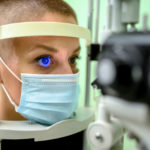By Dave Anderson, OD

Oct. 7, 2020
The pandemic has brought with it a slew of anxieties. Some of those anxieties may be expressed to you in the exam room in the form of questions. Here are four questions that are coming up frequently in my exam room, and how I respond to the patient to provide solutions.
Is it safe to wear contact lenses or are glasses safer?
Some media reports indicated risk related to contracting COVID through ocular tissue and concluded having contact lenses in the eye were unsafe. Additionally, the concern some patients have is “touching around their face” and felt that wearing contacts would cause them to touch their face more.
My response: I explain to the patient that everything is a risk, but simply wearing contact lenses poses no increased risk for exposure or contraction of COVID. Additionally, there have been studies published and reported by the American Optometric Association Contact Lens & Cornea division that the risk is no different than not wearing contacts as long as proper wearing habits and proper hygiene is performed. Additionally, with glasses fogging up, it is actually more likely that someone would touch their face to adjust the glasses or mask compared to wearing contact lenses.
Related Product & Service Recommendations: We are actively offering new fits for contact lenses, and promoting the health benefits of daily disposable contacts with a superior safety profile compared to lenses that require cleaning. We have a high daily disposable lens patient base, with over 60 percent of our patients in that modality, but the remaining 40 percent have been offered the chance to move to a daily lens for increased comfort.
Does blue light protection help my eyes?
People are using digital devices and computers more than ever due to more work from home and fewer activities outside the home (travel, movies, out to eat).
My response: There are lots of studies on the topic, and honestly, I don’t think we will truly know the answer the question for many years. We know the damage UV causes, and this is closely related, but like UV, if we are exposed in low doses with low intensity, there may be little damage. One benefit from blue light is controlling our sleep rhythms, and as a result, many phone manufacturers have a blue filter incorporated into their screens to ensure the user’s sleep patterns are not disrupted.
So, based on this, and the potential harm, I tell the patient that I do think if you are exposed to blue light at a high level, it is worth investing in protection in your glasses. I also think having a pair, even if you don’t need glasses, could be helpful, but it also depends on the amount of exposure. With that said, for those who need glasses, they all should have non-glare treatments to see their best, and adding a blue light blocking layer to that is an easy thing and not much additional cost.
Related Product & Service Recommendations: We offer anti-reflective or non-glare treatments with blue light protection from all manufacturers, so regardless of the lens type needed, the patient will have an option to have additional blue light blocking with their glasses
Other Articles to Explore
This is a big focus of our staff. They are trained to ask a simple question: “How much time do you spend on a computer or digital device during the day?” This opens up the discussion of blue light and the potential need to add additional protection. They also are saying to patients, “Since you need non-glare coating on your glasses, the addition of blue light blocking may also be beneficial.”
Why do I keep getting so many styes?
With the increase in computer use, and fewer recreational activities, patients are glued to their work station computer all day. This can result in the development of styes.
My response: This is likely due to a few factors, namely that with the current environment of non-stop computer use, your eyes are taking the brunt of this work change. Specifically, while using a computer or digital device, your blink rate drops significantly. As a result, the oil glands on your eye lids become hardened, thickened and become blocked in some cases. The inflammation process in some cases leads to a stye, much like how a pimple forms on the skin. The issue is that your computer is not going to go away, so we need to improve your tear function. The first step is taking breaks while working on the computer and working hard to blink more completely and regularly. The second step is to work on the oil glands to create a better functioning gland.
Related Product & Service Recommendations: Depending on the severity, the options are plentiful. With nearly every patient, I recommend a Bruder heat mask to use daily as a prevention, or to help with the current oil blockage. I also offer several different nutraceuticals, including Omega 3 fish oil to help with the thickness of the oil glands. If the blockage or symptoms are beyond any mild stage, I follow-up with a dry eye work-up, including photos of the patient’s oil glands and a non-invasive tear break-up measurement. These help guide the next step, which may include TearCare or MiBo Thermoflo treatment to remove the oil blockage.
My support staff are all trained to say a few simple things about dry eye or styes, which include: “With more computer use, it’s really tough on the eyes in many ways. Our office can help if you are having dryness or other computer-related issues.”
How do I prevent fogging of my glasses?
Having to wear masks is a clear reason for this, and it is a daily frustration for patients.
My response: Sadly, I laugh and point to my glasses that are usually in somewhat of a level of fog by this point. However, I do offer a few suggestions. The first thing I say is that any of the anti-fog treatments available work, but are only a temporary solutions, and not something I want to do all day, but we offer these if you want to try.
I then show them my mask, and how I have it positioned on me. I have a tightly fitting mask, with a wire over the nose that is taped to my face and my glasses sit just at the edge of the mask to keep it sealed down. Finally, I bridge the conversation over to contact lenses and offer them a fitting for contacts.
Related product and service recommendations: I also let patients know that there are now spectacle lenses, such as Shamir Glacier Anti-Fog and Essilor’s Optifog lenses, that prevent fogging.
Anti-Fog sprays and wipes are available in my office, several different brands mostly due to availability. And of course, contact lenses, typically daily disposable for most patients.
My support staff answers by selling the anti-fog spray and anti-fog spectacle lenses. They are trained to let patients know that the anti-fog treatment sprays are only temporary, and remind them to always ask us first before putting any treatment on their glasses so they don’t ruin their lens treatments or warranties. My staff also focuses on the advantages of contact lenses over glasses and the overall safety of contact lenses, even during a pandemic.
 Dave Anderson, OD, is a partner with Miamisburg Vision Care in Miamisburg, Ohio, and a partner with wEyes Guys. To contact: doca@burgvision.com
Dave Anderson, OD, is a partner with Miamisburg Vision Care in Miamisburg, Ohio, and a partner with wEyes Guys. To contact: doca@burgvision.com





















